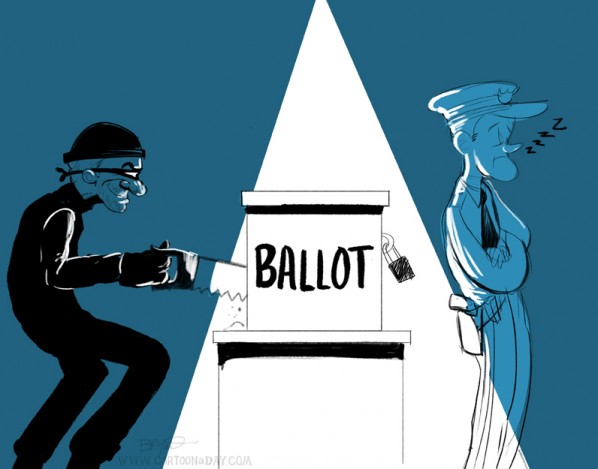
Could the people that pulled off STUXNET hack a voting system without getting caught? Nah… that’d be too hard.
Alt media has been reporting that the US Army has raided a server farm in Frankfurt to seize Scytl-made servers used to tamper with 2020 election ballots.
TX congressman Louie Gohmert has been recorded claiming that he “heard” this but can’t confirm it. Retired AF Lt. Gen Thomas McInerney also claims to have heard news of this event and claims that several servicemen died in the raid. (See minute 42 of the video.)
AP declares the story false, using language taken directly from Scytle’s web page also denying the story (did AP think we wouldn’t notice? Can you repudiate an allegation by quoting the defendant?)
But their denial misses the point, since it doesn’t matter whether Scytl themselves owned or operated the server facility in question. As noted by others, it would be illegal and outrageous for the US Army to raid a facility in a foreign country that is owned by a foreign corporation. This would certainly cause a major diplomatic incident. However, if the server facility were owned and operated by Americans, such as the CIA, as McInerny claims, then US forces could of course raid it on orders from US authorities.
“So what happened? I am reliably informed that a unit under the command of USEUCOM (i.e., United States European Command) did in fact conduct an operation to take control of computer servers. But these servers belong to the CIA, not Dominion or Sctyl.”
Go back to the 1980s, he says – it’s happened before, and in Frankfurt, too.
“A dear friend of mine (a retired DEA officer) told me about an incident where he entered a CIA facility in Frankfurt backed up by the US Army to get info the CIA was withholding (this took place in the 1980s).”
Of note, Scytl voting systems have been outed by researchers as insecure or even maliciously designed to include backdoors, as reported by Vice in May, 2019. The backdoor allows someone to change votes in an undetectable way:
“The vulnerability is astonishing,” said Matthew Green, who teaches cryptography at Johns Hopkins University and did not do the research but read the researchers’ report. “In normal elections, there is no single person who could undetectably defraud the entire election. But in this system they built, there is a party who could do that.”
…
Lewis said that nothing in their analysis suggests that Scytl introduced the flaw deliberately. “It is entirely consistent with a naive implementation of a complex cryptographic protocol by well-intentioned people who lacked a full understanding of its security assumptions and other important details. Of course, if someone did want to introduce an opportunity for manipulation, the best method would be one that could be explained away as an accident if it was found.”
Green agreed.
“I don’t think this was deliberate. However, if I set out to design a backdoor that allowed someone to compromise the election, it would look exactly like this,” he said.
The vulnerable software was previously reviewed by “cryptographic experts” and had professional coding audits by “Big 4” accounting firm KPMG, which found no problems. !! What this means is that, even if the particular machines or software reported to have vulnerabilities were not the ones used in swing states in the 2020 US election, we know that the production of electronic voting systems can be compromised in ways that cast severe doubt on the validity of any election in which they are used. If Scytl’s systems are so abysmally compromised, even after professional audits by world-class firms, how can any electronic voting system be trusted? If we care about public confidence in election outcomes, how can we allow such systems to be used?

Or, maybe the point is that we are not supposed to trust election outcomes? To what actors would the benefit of widespread public distruct in the electoral process accrue?
Curiouser and curiouser.
Green is correct. Cryptography is hard and contains many subtleties not obvious to the layman. Frankly, most application developers do not understand it beyond a superficial level. Something as innocent-sounding as choosing the wrong constant (hard-coded number) can make an algorithm completely insecure. And it would just look like a “mistake.”
Maybe none of this is “true.” But I find it amazing that all of the denials by AP, Scytl and others completely miss the point. No one is alleging that US officials conscripted foreign nationals in an effort to manipulate a US election. How could foreign corporations be trusted? However, US operatives exploiting known problems/backdoors in vote-tallying software in an offshore secure server facility? Now, that sounds like a plan. Or at least, it sounds like a really good Tom Clancy plotline.
In fact, the strongest evidence against this story is that anyone found out. I have to believe that if the CIA (or NSA) wanted to manipulate an election by changing ballot counts, we’d never find out about it. They’re that good. They employ the best cryptographers and mathematicians in the world. This is why AP using phrases like “no evidence of fraud” is laughable. No shit, Sherlock. A well-executed fraud will be accomplished without leaving evidence behind. That is the entire problem with mail-in ballots and electronic voting machines for “trust in elections,” which the left seems to care so little about.
Leftist trigger warning: The comments below have not been moderated. They may challenge your beliefs, opinions or values, or even offend you. Proceed with caution and intellectual preparedness.